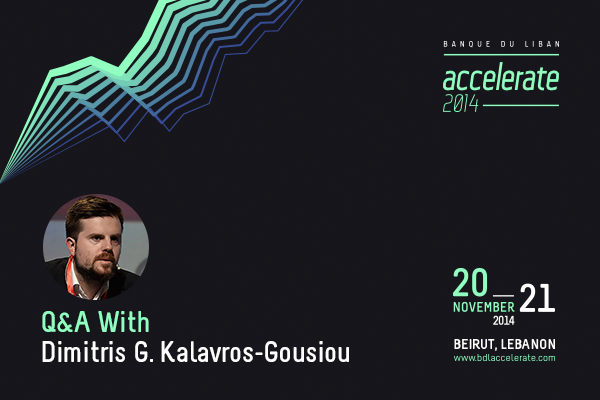Q&A with Dimitris Kalavros-Gousiou
Written by

Dimitris Kalavros-Gousiou
CEO & Co-Founder, Found.ation
Greece
Dimitris G. “DKG” Kalavros-Gousiou is a 26-year-old web-impact entrepreneur and tech maverick. He is best known as the Founder and Curator of TEDxAthens and Co-Founder of digital content house Nest Media. As of March 2013, Dimitris also serves as a Co-Found.er of Found.ation, a technology hub and educational platform in Athens, Greece. From 2011 to 2013, Dimitris served as a Referrer for pre-seed investment firm HackFwd, leading its pipeline from Greece and Southeast Europe. He also occasionally writes for TechCrunch Europe. Over the years Dimitris worked with Fortune 500 entities and multinationals such as COSMOTE (Deutsche Telekom Group), Diageo, Bacardi, The Coca-Cola Company, Piraeus Bank Group, Heineken, Samsung and others. DKG holds a Law degree from the University of Kent at Canterbury and an LLM (Master of Laws) in Computer and Communications Law from the Queen Mary University of London. He is also an alumnus of U.S. Department of State “International Visitor Leadership Program”, class of 2013, and a member of the Global Shapers Community of the World Economic Forum. Dimitris regularly speaks on the topics of entrepreneurship, technology, design thinking, digital storytelling and industry disruption.
What type of ideas are attracting the most funding at the moment?
In the last two years, we have seen a significant growth of actual VC deals in the ICT sector, mainly due to the creation of new Venture Capitals under Program Jeremie, a co-financed investments program by the European Investment Fund. Typically, Greek Venture Capitalists invest in later stage start-up companies in the areas of mobile and social solutions, with less focus on B2B startups. Due to the hype in the industry, we see that they are also looking for companies which belong to what we call the “Unicorns” (companies that have the potential to be the next European billion dollar company). Angel investors come in many forms, and mainly invest in startup companies that have the potential to generate revenues from their first 12 months of operation. Such investors enter an investment scheme, only when a strategic, institutional investor is also involved, typically by leading a round.
What does it take for an idea to disrupt an industry? Are there any disruptive ideas at the moment? Where are they and what can we learn from them?
It definitely requires a detailed and deep knowledge of the target market (or segment) and customers that the startup aims [to reach out for]. Localization provides advantages to transform a range of different ideas into quality products or services. Different countries provide different competitive advantages for different industries. Greece, for example, holds one of the most attractive industries for the development of travel tech startups since it is a popular holiday destination. The sector has attracted both foreign investments and international customers, standing out as an emerging market. The tourism industry is a major contributor to increased economic activity in Greece. The broad scope of the industry means that it also influences other sectors (e.g.: development of instruments and technical solutions, including online, social networking, mobile, IT, etc.)
Which startup are you keeping an eye on? Why?
There’s more than one, since the Greek startup scene has started to gain the visibility we think it deserves. From our experience running one of the first co-working spaces in the country, 3 teams that got their startups up and running are Truckbird, Captainwise and Susurrus. Truckbird is an online realtime freight marketplace. They have launched a technological project that works to advance the field of freight road transportation through online platform that connects shippers with carriers. Truckbird has come up with the right answer to problems of truckload utilization and issues of trustful collaboration and information sharing. The team of Captainwise created the ideal solution for those who need to find their perfect getaway, by simply entering their budget and the days they wish to travel. Captainwise has entered the Greek tourism industry with an alternative idea of online tourism that has changed the way people travel. Susurrus is a platform that matches bloggers with brands looking for a new way to increase their awareness. It collects data from fashion blogs regarding their audience and the quality of their content and if you are a designer you can find the bloggers that suit your characteristics and provide them with your ideal concept. There is not enough good quality content produced by and for brands and it seems that Susurrus has found the next big thing in online marketing field…
What can Lebanon’s ecosystem learn from Athens? What do you think is the country country’s biggest asset, which it can bank on to take its ecosystem to the next level?
Found.ation believes in, and actively supports, the creation of a sustainable startup ecosystem. A major challenge we must tackle is the transformation of good and promising ideas into sustainable businesses which can leave their actual economic footprint in the Greek economy. In addition to the variety of open, wide quality events and education of offerings for startups (Found.ation has organized and hosted so far more than 120 education and networking events on topics such as web and mobile development, design and business marketing), we produce and run in depth accelerator programs where we provide a holistic and comprehensive boost to startup teams and talented first time entrepreneurs.
We believe that the success of young entrepreneurs requires substantial investment in their craftsmanship and skills, especially in the high-technology sector. A successful startup ecosystem is best built through young entrepreneurs who are equipped with the right tools, educational resources and networking opportunities.
